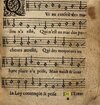For any who might have a historical interest, this is album of Psalms of the Geneva Psalter, set by Claude Goudimel, Pascal de l'Estocart and Jan Sweelinck, performed by the Claude Goudimel Ensemble and released by Alte Musik. The Psalms are sung a capella in 16th-century French, and give a good idea of the sound of Huguenot worship.
The album Psaumes de la Réforme (Psalms of the Reformation) can be purchased digitally for $5.99 (USD). http://shop.classicsonlinehd.com/albums/53ca97479d29c90e4c0004fb?type=download
Included are 17 of the Psalms as well as two other pieces set by Goudimel (Par le déset de mes paines, Cantique de Siméon).
These are a delight to listen to. This sort of early music is unfortunately seldom recorded.
The album Psaumes de la Réforme (Psalms of the Reformation) can be purchased digitally for $5.99 (USD). http://shop.classicsonlinehd.com/albums/53ca97479d29c90e4c0004fb?type=download
Included are 17 of the Psalms as well as two other pieces set by Goudimel (Par le déset de mes paines, Cantique de Siméon).
These are a delight to listen to. This sort of early music is unfortunately seldom recorded.

